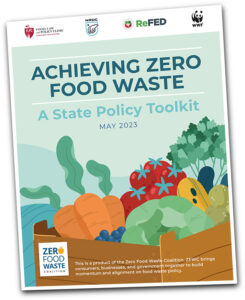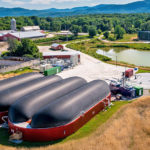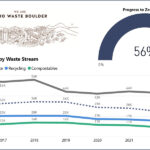Creation of the Zero Food Waste Coalition and the release of its State Policy Toolkit were announced during the opening plenary of ReFED’s annual Food Waste Solutions Summit in St. Louis (MO) on May 17. The Coalition is a collaborative initiative spearheaded by the Harvard Law School Food Law and Policy Clinic (FLPC), Natural Resources Defense Council (NRDC), World Wildlife Fund, and ReFED. “The Zero Food Waste Coalition represents a formalization of our partnership to build momentum and align on food waste policy,” state the founding Coalition members. “Over the past few years our organizations have worked with 60+ groups to develop the US Food Waste Action Plan and Opportunities to Reduce Food Waste in the 2023 Farm Bill Report. By amplifying our collective voice, we can make a greater impact and engage our broader networks. We are excited to take the next step and engage stakeholders and partners to continue to advance responsible and ambitious federal, state, and local food loss and food waste policy.”
 “Achieving Zero Food Waste: A State Policy Toolkit” is a culmination of lessons learned from state leaders and local advocates who have led the charge in developing and implementing all the top food loss and waste policies, according to the Coalition. The toolkit highlights 15 different food waste policy opportunities across six categories and best practices that policymakers and advocates can draw upon to accelerate food waste policy in their own states. Each policy is accompanied by model legislation that could be adapted for each state’s unique context. The six categories are: Building and Broadening Organic Waste Bans; Opportunities to Promote Food Donation; Supporting Organic Waste Processing Infrastructure; Developing End Markets for Compost; Preventing Food Waste Upstream; and Other Governmental Action.
“Achieving Zero Food Waste: A State Policy Toolkit” is a culmination of lessons learned from state leaders and local advocates who have led the charge in developing and implementing all the top food loss and waste policies, according to the Coalition. The toolkit highlights 15 different food waste policy opportunities across six categories and best practices that policymakers and advocates can draw upon to accelerate food waste policy in their own states. Each policy is accompanied by model legislation that could be adapted for each state’s unique context. The six categories are: Building and Broadening Organic Waste Bans; Opportunities to Promote Food Donation; Supporting Organic Waste Processing Infrastructure; Developing End Markets for Compost; Preventing Food Waste Upstream; and Other Governmental Action.
“State leaders have proven that food waste reduction policies, from banning organic waste from landfills to promoting food donation to developing markets for compost, are effective and necessary for our environment, economy, and people,” explains Emily Broad Leib, Clinical Professor of Law at Harvard Law School and Faculty Director of FLPC. “States have developed a suite of actionable policy options that address local challenges through rigorous experimentation. There is significant opportunity for other states and the federal government to replicate and scale up these policies to help alleviate food insecurity, reduce environmental harm, and build a more sustainable food system for our future.”













